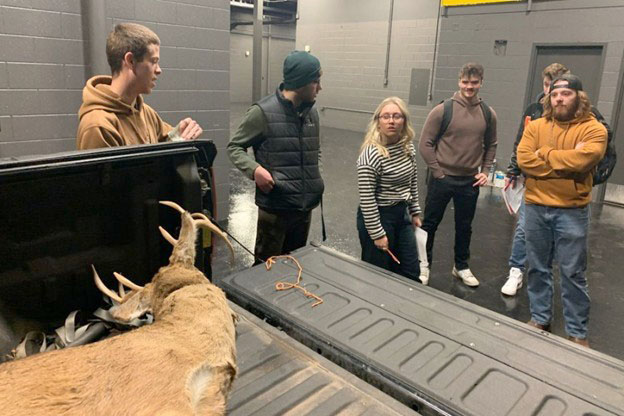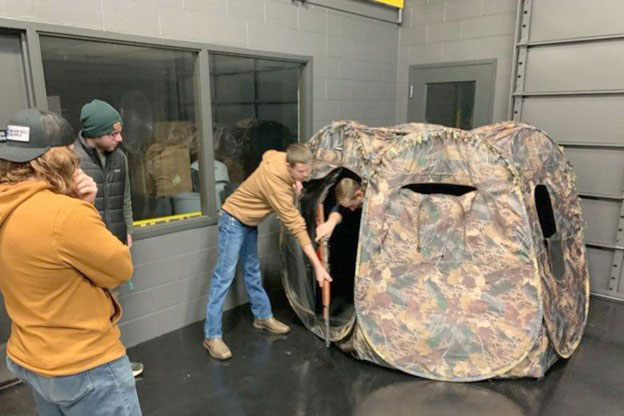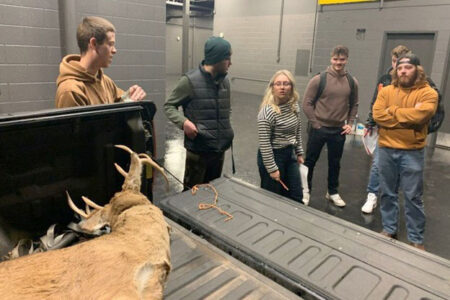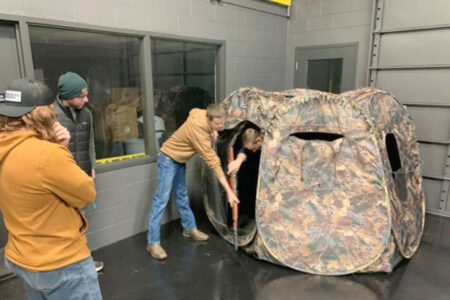NMU program helps to train conservation officers
- Northern Michigan University students examine a fake deer carcass loaded in the back of a hunter’s truck. Students in the university’s Conservation Law Enforcement program handle several mock crime scenes to learn how to investigate environmental crimes. (Jeremy Sergey photo)
- A conservation law enforcement student pulls a hunter out from his blind as part of a class scenario. Mock crime scenes are run in Northern Michigan University’s Public Safety Institute training room. (Jeremy Sergey photo)

Northern Michigan University students examine a fake deer carcass loaded in the back of a hunter’s truck. Students in the university’s Conservation Law Enforcement program handle several mock crime scenes to learn how to investigate environmental crimes. (Jeremy Sergey photo)
LANSING — As a group of Northern Michigan University students huddled around the carcass of a northern pike supposedly caught earlier that day, they knew something was wrong: The fish was far too small.
Michigan law requires anglers to release northern pike if they’re less than 24 inches long in an attempt to protect fish before they mature and can reproduce.
The students approached an angler standing nearby, interviewed him and began matching evidence to a filed complaint to find out if he violated state fishing regulations.
Before long, the students ascertained that the man had illegally caught the northern pike.
That is one of several scenarios students take on when they enroll in NMU’s wildlife conservation law and policing program.

A conservation law enforcement student pulls a hunter out from his blind as part of a class scenario. Mock crime scenes are run in Northern Michigan University’s Public Safety Institute training room. (Jeremy Sergey photo)
For students hoping to become conservation officers for the Department of Natural Resources — tasked with enforcing fish, game and natural resource protection laws — the class gives a glimpse into their day-to-day work.
Jeremy Sergey, a conservation officer who teaches the class called Conservation Law Enforcement, said his goal is to immerse students in the lifestyle of conservation officers.
“I like to bring in a lot of recruits and show students what the training is like,” said Sergey, who has been an officer since 2016. “I might throw a couple of scenarios at them.”
Topics range from the history of state and federal wildlife conservation law enforcement to comparative discussions about wildlife rangers protecting endangered species in Africa and Asia.
Since Sergey began teaching in fall 2023, two students have gone on to graduate from the DNR’s 23-week conservation officer training academy.
Joseph Budnick is one of them. He graduated from the academy in early July and will work in Mackinac County after field training with a veteran officer. Another former student, Olivia Haerr, graduated in the same cohort and is assigned to Baraga County.
After taking Sergey’s class, Budnick — who already had an interest in conservation work — knew “as soon as another academy was going to run, I was going to be applying for it.”
Much of the wildlife conservation policing program blossomed out of NMU criminal justice professor Greg Warchol’s research into illegal wildlife trading and poaching in Africa.
Warchol teaches Environmental Conservation Criminology, one of three classes all students enrolled in the program have to take before graduating with a minor in wildlife conservation law and policing.
Criminology is the scientific study of crime and borrows from fields such as sociology, psychology, economics and statistics to determine why people commit crimes and how to prevent them.
In his environment-focused class, Warchol said, students grapple with “what kind of person goes out and poaches wildlife in a national or state forest in Michigan or poaches animals in Africa and Asia.” Students also learn about what domestic law enforcement and their international counterparts do to combat those crimes.
While most of Warchol’s research is focused on environmental crimes — or “green crimes” — in Africa, he suspects illegal hunting is fairly common in the U.S. In 2024, the Michigan DNR generated more than 10,000 poaching complaints from 43,250 calls.
The average person doesn’t poach out of desperation, according to a 2020 Arizona State University report on illegal hunting on federal land. Rather, they’re often driven by potential profits, thrill or excitement and the “relatively low risk” associated with the crime.
Investigating environmental crimes comes with several disadvantages, Warchol said. Often, victims are wildlife or their surrounding environment and they can’t provide statements, the crimes are committed in remote parts of the forest and tips from the public are limited.
Warchol suspects that “a great number” of crimes in national and state parks likely go unreported, partly because there aren’t enough conservation officers to cover the vastness of DNR land. Roughly 250 conservation officers are spread across Michigan.
One solution besides increasing enforcement or militarizing conservation efforts — as is the case in some African countries — is to educate people on the value of wildlife.
“It’s a problem you’re never going to end, but it’s a problem you can control and reduce to a certain extent, because there’s always demand for wildlife products,” Warchol said.
Budnick, the conservation officer, said he took that job because he wanted to protect animate and inanimate natural resources that, without protection from the DNR, would be vulnerable to exploitation.
Sergey, the adjunct instructor and conservation officer, said he continues to review his class each semester, finely tuning the curriculum to what students are interested in pursuing after school, whether it’s working as conservation officers or as firefighters for the DNR.
“It’s a project, it’s in development,” Sergey said. “But I think it gets better and better every year.”
———
Emilio Perez Ibarguen reported this story for a partnership with the Mott News Collaborative in cooperation with Capital News Service, Bridge Michigan, Capital News Service and Michigan State University’s Knight Center for Environmental Journalism.





